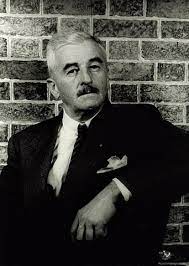William Faulkner
William Faulkner (born William Cuthbert Faulkner; September 25, 1897 – July 6, 1962) was an American writer and Nobel Prize laureate known for his novels, short stories, and plays set in the American South. Widely regarded as one of the most influential authors of the 20th century, Faulkner created the fictional Yoknapatawpha County, which served as the setting for many of his greatest works.
| William Faulkner | |
|---|---|

| |
| ' | |
| Born | 25 september 1897 |
| Birthplace | New Albany, Mississippi, U.S. |
| Nationality | American |
| Occupation | Novelist, short story writer, screenwriter, essayist |
| Known for | Nobel Prize-winning novelist of the American South |
| Website | https://en.wikipedia.org |
Early Life
Faulkner was born in New Albany, Mississippi, and raised in Oxford, Mississippi, where he would spend much of his life. His Southern upbringing and environment profoundly shaped his imagination and narrative style. Over time, Oxford and its surroundings became the foundation for his fictional settings.
William Faulkner Oxford Mississippi
The town of Oxford, Mississippi played an essential role in William Faulkner’s life and career. It was in Oxford that he wrote many of his masterpieces and where his home, Rowan Oak, is preserved today as a historic site. The connection between William Faulkner and Oxford remains central to his legacy, as the town inspired his fictional Yoknapatawpha County.
William Faulkner Books
Faulkner wrote an extensive body of work that continues to be studied worldwide. Some of the most significant William Faulkner books include The Sound and the Fury (1929), As I Lay Dying (1930), Light in August (1932), and Absalom, Absalom! (1936). His writing is often recognized for its complex narrative structures, stream-of-consciousness technique, and exploration of themes such as race, history, and the human condition.
William Faulkner Novels
The William Faulkner novels are regarded as masterpieces of modernist literature. Faulkner’s stories often interconnect, set within the same Southern landscape. The Sound and the Fury is among his most celebrated works, while Sanctuary, Intruder in the Dust, and Go Down, Moses highlight his ability to blend gothic elements with social critique. His novels earned him the Nobel Prize in Literature in 1949.
A Rose for Emily William Faulkner
One of his most famous short stories, A Rose for Emily by William Faulkner, was published in 1930. The story explores themes of isolation, memory, and the decaying traditions of the Old South. It remains a staple of American literature courses and a vivid example of Faulkner’s gothic and psychological style.
Barn Burning William Faulkner
Another widely studied short story is Barn Burning by William Faulkner, first published in 1939. The story centers on family loyalty, morality, and justice through the perspective of a young boy conflicted by his father’s destructive behavior. It is considered one of Faulkner’s most powerful explorations of family and social responsibility.
William Faulkner Cash Character Book
Faulkner’s novel As I Lay Dying features the character Cash Bundren, whose perspective has been widely analyzed by scholars. The William Faulkner Cash character book section of the novel is especially significant for its unique narrative style and philosophical depth. Cash’s reflections represent Faulkner’s experimentation with point of view and interior monologue.
Collected Stories of William Faulkner
The Collected Stories of William Faulkner, published in 1950, gathered many of his greatest short works and won the National Book Award. This collection includes some of his best-known short fiction such as Spotted Horses, That Evening Sun, and Dry September. The volume solidified his reputation not only as a novelist but also as a master of the short story form.
Legacy
William Faulkner’s influence on world literature remains profound. His works shaped generations of writers, including Gabriel García Márquez and Toni Morrison. He won the Nobel Prize in Literature in 1949 and twice received the Pulitzer Prize for Fiction. His innovations in narrative technique, along with his exploration of the American South, ensure his enduring significance in world literature.